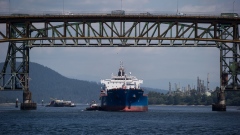Feb 9, 2022
Protest starts to bite as Ford is forced to close engine plant
, Bloomberg News
Vaccine mandates, one of Canada's most unnecessary pieces of legislation in history: Martinrea co-founder
The protest blocking freight traffic from Detroit into Canada is starting to hit crucial supply chains, as Ford Motor Co. was forced to idle a Canadian engine factory and operate an assembly plant at reduced capacity.
Ford’s engine plant in Windsor, Ontario, is shut down and the schedule cut back at a factory in the Toronto suburbs that makes the Edge model, spokesperson Said Deep said Wednesday an email. The automaker is continuing to ship engine inventory to U.S. plants, he added.
The blockade of the Ambassador Bridge between Detroit and Windsor by protesters angry over COVID restrictions is in its third day, with no end in sight. Windsor officials said Wednesday they prefer a negotiated settlement over using force to tow away the vehicles that have clogged the city’s streets and prevented trucks from crossing the border.
Windsor Mayor Drew Dilkens said the city’s police department is negotiating with multiple groups to try to persuade them to voluntarily leave the city’s streets so the bridge can be fully reopened. Even as they negotiate, Dilkens said they can’t let protests go on too long because of the threat of economic damage -- including the potential impact on U.S.-Canada trade and the auto plants in Ontario and Michigan.
“We need to plan for a protracted protest,” Dilkens said in a press conference in Windsor. “We are striving to resolve this issue safely and peacefully. Our community will not tolerate this situation for long. Every hour this protests continues, our community hurts.”
Dilkens said the city fears bringing in tow trucks would inflame the situation on the ground, where 50 to 75 vehicles and about 100 protesters remain after two days.
“You have people on the ground that say this cause is so passionate for them that they are willing to die for it,” Dilkens said. “It’s fair to say for all of us that we don’t want to see people get hurt. You’re trying to have a rational conversation and not every person on the ground is a rational actor.”
WHITE HOUSE CONTACT
Most protesters say they’re there in opposition to a vaccine mandate for truck drivers or because of COVID-related restrictions that have been in place, in some form, for nearly two years in Canada. Part of the problem, though, is that police are not dealing with a unified group of interests, Dilkens said.
“I’m sure if you asked 100 folks who are here, you’d probably get a different list of what the top three important issues are from every single one of them,” he said.
Windsor Police Chief Pam Mizuno said the officers have asked some protesters to step forward and act as leaders in negotiations.
Leaders in Windsor and Ontario are worried about economic damage from the shutdown. Dilkens said 2,600 businesses and 10,000 people are employed in the warehousing and shipping sector that relies on the bridge, and every day about $450 million (US$355 million) in goods cross between the two countries.
The blockade forced Stellantis NV to curtail two shifts at its assembly plant in Windsor on Tuesday because it couldn’t obtain parts, the company confirmed. The Windsor plant, which makes the Chrysler Pacifica and Voyager minivans, resumed production Wednesday, said Jodi Tinson, a spokeswoman for the company.
White House Press Secretary Jen Psaki said the Biden administration is in close contact with Canadian authorities, Michigan Governor Gretchen Whitmer and auto industry officials about the situation.
U.S. border officials “have worked with Canadian counterparts to route traffic from Ambassador Bridge to Blue Water Bridge” in Port Huron, Michigan. “There’s still a lengthy delay but it is enabling some of these trucks and transports to get through.”








